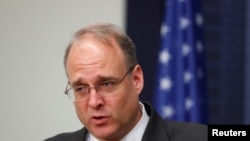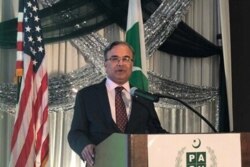Pakistan could still be placed on the blacklist of the Financial Action Task Force (FATF), a global watchdog monitoring terror financing and money laundering around the world, its president said last week.
Marshall Billingslea, the president of FATF, said Pakistan could still be placed on its blacklist for allegedly not taking adequate action against terror financing and money laundering in the country.
“There absolutely a possibility [of Pakistan being blacklisted, but again I would not because that’s a decision for a future plenary,” Billingslea said in response to a question posed by a Voice of America reporter in Orlando, Florida, where the body convened for its recent meeting.
“The period for the action plan has not expired. The next plenary is in October and Pakistan would be assessed,” Billingslea added.
On the gray list
Pakistan has been in the watchdog’s grey list since June 2018 for its alleged failure to adequately crackdown on terror financing and money laundering in the country. That decision was made in March 2018 in Paris where representatives of different member countries and international organizations met to discuss the global issue of money laundering and financial crimes.
The designation at the time reportedly followed a motion introduced by the United States, along with France, Britain and Germany, alleging that Pakistan has failed to adhere to the FATF guidelines on terror financing and anti-money laundering regulations.
Last year was not the first time that Pakistan was placed in the FATF’s gray list. The country was on the list from 2012 to 2015.
Pakistan has long feared that the country’s economy could be hurt and FATF’s action could take a toll on the country’s access to the international financial markets.
Pakistan defends its records on taking measures against militant groups and their terror financing networks.
Terror financing remains a major concern and challenge in Pakistan, where militant groups allegedly raise money under the guise of religion and welfare for the poor and instead spend it on terror-related activities inside Pakistan, and in India and Afghanistan.
Blaming India
Pakistan blames its rival India for what it calls “the politicization of FATF process” by the latter. The country’s foreign office said it is determined to actively fight terror financing in the country.
“We hope the broader FATF membership would take cognizance of this continuing malicious campaign and reject any attempt aimed at the politicization of the FATF process by India.” Pakistan’s Foreign Office said in a statement following FATF’s meeting last week.
Asad Majeed Khan, Pakistan’s ambassador to the U.S. also blamed India for pursuing a political agenda against Pakistan.
“We should not let any one country basically pursue its political agenda vis-à-vis Pakistan through these international institutions and channels,” Khan said this week during an event at the Carnegie Endowment for Peace, a Washington-based think-tank.
“We also feel that we have done a lot. We are clear and determined to do more but we would not want the jury to be rigged. And where there are predetermined positions be it the statements issued by the Indian minister of finance, be it statements issued by their other senior leaders publicly calling for the blacklisting of Pakistan,” Khan added.
India’s role
India’s Minister of Finance, Arun Jaitley, said last month that the country would push for Pakistan’s inclusion in the FATF’s blacklist of countries that failed to meet international standards in curbing financial crimes.
“We want Pakistan downgraded on the FATF list,” Jaitley told reporters.
Some analysts like Michael Kugleman, deputy director of South Asia Program at the Woodrow Wilson Center, charge that Pakistan’s designation in the FATF’s list cannot be blamed on India and Pakistan must assume responsibility.
“Pakistan tends to blame India for all types of misfortunes. You cannot blame India for FAFT’s decision. FAFT is a multilateral organization, it is not defined by unilateral measures. …This is not the first time Pakistan was gray listed by FAFT,” Kugleman told VOA.
Consequences
Placement on the FATF’s gray list or even worse, its blacklist, has dire consequences for an already debt-ridden country like Pakistan, analysts warn.
Pakistani economist Zubair Iqbal says FATF has “very strong political connotations” because they can “recommend restrictions on transactions and financial relations with Pakistan.”
“That becomes an issue because other countries tend to then follow FATF instructions. And that adversely affects Pakistan or any country’s relations with the international financial system,” Iqbal added.
Huma Sattar, a Pakistan-based analyst and economist, believes that should FATF blacklist Pakistan, it will seriously undermine Pakistan’s prospects for attracting investment to the country.
“Placing on the FATF blacklist would send a very wrong signal to the world, especially those looking to Pakistan as an emerging market for investments. Given Pakistan’s recurrent macroeconomic challenges, it needs strong ties with the global community and international financiers,” Sattar said.
“A blacklisted Pakistan may also incur problems with the recently penned IMF program. Not to mention, it would decidedly threaten Pakistan’s efforts to dismantle the global narrative that the Pakistani state sponsors terrorism,” she added.
Kugleman of the Woodrow Wilson Center maintains that Pakistan recognizes the sensitivity of remaining in gray list or even moving to the blacklist and expressed optimism that the country would take measures accordingly.
“Pakistan is very sensitive about their global image. Being blacklisted or remaining on the gray list has a bad connotation and gives a bad global image. Pakistan recognizes this and will want to change for the better to avoid risking financial setbacks,” Kugleman said.
FATF will announce its formal decision in October.






